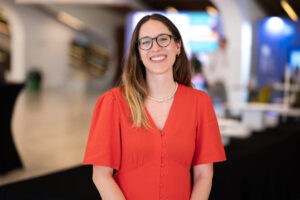Words: Leonardo Marino and Silvia Fiore
The SXSW EDU Conference & Festival, described by one of the participants as a “patchwork quilt of needs and ways that they can be met”, brings together educators, researchers, policymakers, and innovators from various fields in a vibrant and dynamic event focused on the future of education and learning. This year’s edition, held in Austin, Texas on 4-7 March 2024, offered a wide variety of panels, expos, workshops, networking opportunities and film screenings. Topics included different approaches to access educational material, pre-prints, or databases, and best practices across the education sector.
Domenico Vicinanza, GÉANT Senior Research and Engagement Manager and Coordinator for Arts and Humanities, attended the event and – over the course of the first three days – ran three demo sessions showcasing eduMEET v4.0.

eduMEET v4 demo sessions at SXSW EDU 2024
As the digital age continues to reshape the landscape of education, there is a growing need for user-friendly technology to enable remote tuition and high-quality video communication in classrooms. The need for versatile and reliable web-conferencing platforms has become increasingly apparent, especially in the wake of the global shift towards remote learning. In this context, eduMEET, the WebRTC web-conferencing software developed within the GÉANT project, has emerged as a potential game-changer in remote education, being free, open source, tailored to R&E needs, and highly focused on security and privacy.
SXSW EDU 2024 served as the perfect platform to explore and test the capabilities of the new eduMEET v4, a completely re-built and improved version, also introducing a series of innovative features. During three demo sessions conducted on consecutive days, Domenico showcased the platform’s ability to facilitate remote connections spanning from the room next door to distant locations across the United States, including Tennessee, Illinois, and New York. Utilising the GARR deployment of eduMEET, Domenico assessed the platform’s performance and identified key areas for future improvements that he shared with the eduMEET team.
Bartlomiej (Bartek) Idzikowski (PSNC), coordinator of the eduMEET spin-out and member of the eduMEET Board of Directors within The Commons Conservancy (TCC), commented:
“Presenting eduMEET v4 at SXSW EDU allowed us to engage with a community of innovators, education experts and futurists and gather valuable feedback and fresh ideas. In the current stage, eduMEET is moving forward with the ongoing spin-out process into a self-sustaining, community-financed software, while we are also investigating the possibility of forming an eduMEET Federation, involving media nodes in different NRENs to form a distributed service. As such, we take this chance to extend once again our invitation to organisations and developers interested in contributing their support.”
Get involved by contacting the eduMEET team https://edumeet.org/contact-us/
or by joining the eduMEET community on GitHub https://github.com/edumeet/
The future of education and learning
GÉANT’s participation in the event meant having a unique occasion to discover new solutions to access and distribution problems faced by our research and education networking community, to exchange ideas, and to form partnerships to promote early and open sharing of research.
Here are some of Domenico’s highlights from the event.
Artificial Intelligence and Data Privacy
One of the standout themes at SXSW EDU 2024 was the growing emphasis on AI-driven tools and platforms that adapt to individual student needs, providing tailored learning experiences, ultimately enhancing student engagement and academic outcomes. Given this trend, discussions around ethical considerations and data privacy have naturally gained significant traction. The event addressed these concerns by directly involving students in training AI, feeding data, notions, behaviours and analyse the responses. Experts discussed on the need for transparent algorithms, data security measures, and the ethical use of student data, ensuring that AI technologies in education prioritize student well-being and privacy.
Virtual Reality (VR) and Gamification for education
SXSW EDU 2024 showcased the transformative potential of VR in education as it allows students to explore new worlds, make sense of complex concepts, and engage in immersive learning experiences. Gamified learning platforms and applications were also showcased, illustrating how game mechanics can enhance student motivation, engagement, and knowledge acquisition.
Collaborative Learning through technology
The power of technology in fostering collaboration among students was another growing topic at SXSW EDU 2024. Educators showcased how technology tools such as collaborative online platforms, video conferencing, and project management software can facilitate teamwork, communication, and problem-solving skills. These collaborative learning experiences prepare students for the demands of the modern workforce, where teamwork and effective communication are vital.
Quantum Technologies in schools
With quantum computing poised to revolutionise the technological landscape, educators and scientists presented and discussed the importance of integrating quantum information science into the curriculum at an early age. There are portals and companies now specialising in that – i.e. Q-CTRL which had a booth at the event. As the demand for expertise in quantum computing grows, it is essential for schools to allow for early exposure to quantum technologies as it will not only prepare students for advanced studies in math and science but also pave the way for fulfilling careers in related fields.
Humour and Comedy in science education
With her keynote, Sarah Rose Siskind from hellosci.com, brought to the attention of the audience the importance of humour and comedy in science and technology education. She shed light on the decline of interest in technical subjects from early years to college and university, attributing it, in part, to the perception that lessons in these fields are often dull and uninspiring. The keynote emphasised that by incorporating humour into science education, educators can create a more vibrant and accessible learning environment, thereby igniting interest in science and technology among students.
Read more about SXSW EDU: https://www.sxswedu.com/
Read more about eduMEET: https://edumeet.org/







